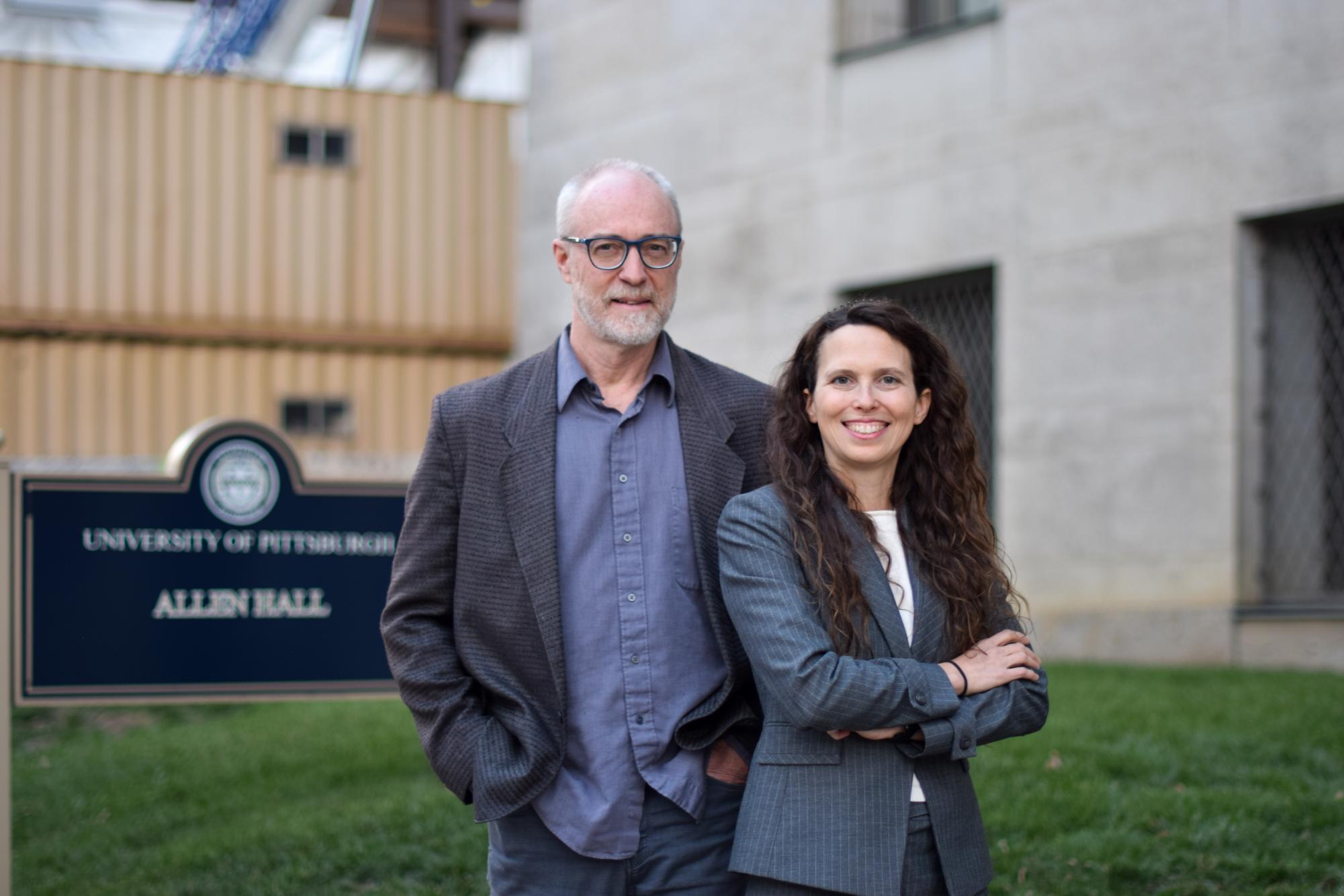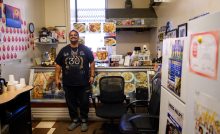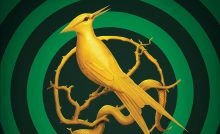‘I’d love for Bigfoot to exist. He seems like he’d be great at a party’: New course module helps students analyze pseudoscientific claims


Melanie Good and Eric Swanson pose for a photo in front of Allen Hall.
Checking your horoscope may be fun, but it’s important to understand that you’re engaging with false information, according to Melanie Good.
As a part of a new module aimed at fighting pseudoscientific beliefs, Good and Eric Swanson conducted a survey which revealed that people are more likely to believe in one conspiracy theory if they already believe in another.
“What we’re finding is some correlation between people who believe certain claims and people who believe other claims,” Good, a professor in the physics and astronomy department, said. “So it becomes a slippery slope.”
Good and Swanson, both professors in the physics and astronomy department, have formed a new course module starting this semester called “A Candle in the Dark.” The title is an ode to famous scientist Carl Sagan’s book “The Demon-Haunted World: Science as a Candle in the Dark.” The course module debunks popular conspiracy theories and “fields” of pseudoscience and aims to equip students with the skills to determine genuine scientific research, and many courses currently use the module. Good uses the module in her “Basics of Spaceflight” class and Swanson uses it in his “Physics and Society” class.
According to Scientific American, pseudoscience, or fake science, is information not based in scientific fact or determined through the scientific method that gets mistaken as genuine and venerated science. Astrology is one of the most famous examples of pseudoscience, but the flat Earth theory, the carnivore diet and the Bermuda Triangle are modern examples of conspiracy theories many people believe in.
“Some people might say, ‘Oh, that doesn’t matter. It’s harmless or whatever.’ But in actuality, that person is being disempowered,” Swanson said. “They’re not in full contact with what’s happening around them, because they believe so many things that are untrue. So we’re trying to empower students.”
Swanson said there are two main causes for the existence of pseudoscience. The psychological reason is that people tend to believe things that support their previously held beliefs. The other — sometimes people believe just because it seems fun.
“NASA spent money decades ago on an antigravity machine, and after a freshman physics course you know that such a machine couldn’t exist, ” Swanson said. “It’s the motivation for a lot of this, ‘Hey, it would be cool if we had a device that could control the weather.’ I’d love for Bigfoot to exist. He seems like he’d be great at a party.”
According to Good, debating the existence of Bigfoot can be fun, but seriously entertaining some conspiracy theories can have detrimental consequences. A countless number of scientific articles are published everyday, and headlines can be confusing, and at worse, diametrically opposing.
“This is meant to be a very interactive way of helping students explicitly confront the claims of pseudoscience and conspiracy theories,” Good said, “with the hope that actually examining these things through the tools of tools of science will help them sort of see through those claims, and also develop the ability to better ascertain for themselves when they hear a claim whether or not it’s a well-founded claim.”
Good said the impetus for the module occurred when she received an email from a news outlet asking for a comment about the U.S. Intelligence report on UFOs. She said she knew Swanson had a unit in his Physics and Society course on pseudoscience already, which they used to build into the new course module.
“The idea that just teaching them more science will automatically reduce their belief in pseudoscience may not be a supported idea,” Good said. “We actually have to talk about pseudoscience in order to address [these beliefs].”
Physics and Society focuses on the fundamentals of modern physics with the goal of getting students to understand the basics of contemporary physics discussion, according to Swanson. He said he’s found that in class, students don’t stop believing in pseudoscience by teaching them more science, which is why the new module is necessary.
Students have popular conspiracy theories debunked by the module, but they also learn to analyze research methods and means to better parse through the pages of results. Understanding how to determine if scientific research has validity helps students make better decisions.
“Some pseudoscience is harmless — if you want to believe in the Easter Bunny, that is not such a terrible thing. But if you’re making decisions about your health that are based on false claims or pseudoscience then it’s not harmless,” Swanson said. “Maybe you’ve heard that salt is really bad for you and so you don’t eat any salt. Or maybe you’ve heard it’s not so bad for you, so you down tons of salt. It makes a difference in your life.”
According to Good, the scientific method of demanding evidence is a largely useful skill, and its practice can be transferred to many situations. In a jury, jurors are asked to demand evidence and ultimately make a decision once the court has gathered all of the information of the case. Good ran an exercise in class where they pretended to be in a jury to practice engaging with scientific reasoning.
“We actually acted out a mock trial after telling them the problems with eyewitness accounts, because that’s part of pseudoscience. ‘I’ve seen Bigfoot,’ ‘I was abducted by aliens,’ ‘This looks like the Loch Ness Monster,’ and it’s all based on eyewitness accounts. And it ties into jury trials as well,” Good said. “So we did a little mock trial in which someone was accused of stealing a Nintendo Switch at a college party. They had fun with it and it got them thinking like a scientist.”
Good said the main goal of the module is to empower students to make better decisions based on hard founded evidence. Pseudoscientific claims have the potential for disastrous consequences, and Good and Swanson aim to minimize that possibility.
“Going back to the pandemic, people died because of a belief in unfounded things,” Good said. “‘I shouldn’t get a vaccine.’ ‘I shouldn’t wear a mask.’ ‘I shouldn’t isolate.’ And people died, and that’s just one example. God, the planet is slowly suffering because of climate change denial, and all of these things affect not only people but the health of our planet. So you know, I think at the end of the day, we’re just trying to help make it a better world for everybody.”
Recent Posts
Kevin’s Deli voted best Black-owned business in The Pitt News’ survey
Right out of high school, Kevin McAllister began working at the Webster Hall Deli in…
Opinion | Pitt student staples that didn’t win TPN’s ‘Best Of’ this year
University of Pittsburgh students have spoken, and the results for the best Pittsburgh and Oakland…
Review | The newest “Hunger Games” release, ‘Sunrise on the Reaping,’ feels unsurprising but hopeful
Suzanne Collins’ newest release, “Sunrise on the Reaping,” introduces readers to the 50th Hunger Games,…
‘Remember the Ladies’: Heinz Chapel Women in the Windows tour celebrates Women’s History Month
In a letter to her husband, John Adams, Abigail Adams asked him to “remember the…
Cava Mezze is coming to Forbes this year, bringing Greek flavors to Pitt’s campus
Cava Mezze, a sit-down restaurant that offers tapas-style bites and traditional Greek dishes for brunch,…
ScienceWriters2025 conference loses Pittsburgh as host after Pitt and CMU withdraw support
Research budget cuts led Pitt and CMU to cancel their commitment to host the ScienceWriters2025…

